So You Think You Want To Be A Police Dog Handler?
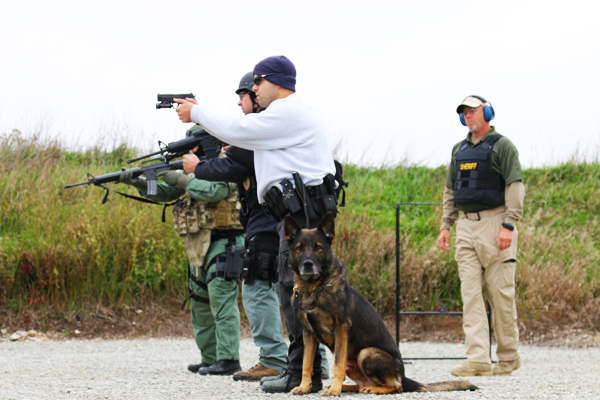
Foreword by Ed Frawley
I met Kevin Sheldahl in 1984 at a police K-9 school in Kansas. We have been good friends ever since. Kevin is a retired police K-9 handler. He became a K-9 Instructor and an International Police Dog Judge. Kevin's company K-9 Services runs 6-week police K-9 courses in which police officers learn how to become new K-9 handlers. To date, he has run 70 6-week courses and trained over 1,200 K-9 handlers. I don't know of another dog trainer that has Kevin's experience and knowledge of police service dogs training.
Recently I was asked to write an article about being a K-9 handler and the experience gave me pause. I've written articles in the past, but it had been a few years. After participating in a couple of decades of training and education I had to ask myself: What do I have to offer? Sure, I can train handlers and I'm good at deploying dogs. I've worked in a variety of environments, including patrol, tactical operations, and interdiction efforts, as well as security operations for dignitaries and sporting events. I've even found a few of our deceased. I preach a lot about this craft being a hands-on, experience-driven specialty. What could I write about? What do I have to say?
I blew off the idea of writing articles for a while. Instead, I wrote curriculum and expert reports and knocked out a few PowerPoints. But I missed writing eventually—I miss trying to motivate and or entertain or even bemuse current or potential K-9 people in print.
I have often thought about the books and articles I have read about service dog training—those from civilians, law enforcement, and military—and something seems lacking. It's not their content. Many are superbly written and the authors show they are well versed in the craft of dog training and/or law enforcement education.
But some questions lingered: Is there something that affects the guy/gal that is just starting out in this escapade called dog handling and struggling to become a handler that I can offer? Is there some insight into being a handler I can convey?
There seems to be missing an understanding of what this task entails until the prospective handler is elbow-deep in the mechanics of it. The technical information seems to be out there. But the art of training and deploying is only partly an academic skill. It must be experienced and felt. It's a craft.
There's a need to have hands-on under the guidance of someone who has been there, who has trained dogs, educated handlers, and experienced the field firsthand. That doesn't come from reading a book or an article. The craft must come from a mentor. But maybe—just maybe—I could touch the soul of the perspective handler enough to influence them as they approach their journey.
Maybe I think too much of myself but hell I am going to give it a try. Following are some essentials for those of you getting started.
Training dogs is a craft. You need a dog and a leash. High tech crap hasn't changed the basics of training and deploying dogs. You have to have boots on the ground and have an opportunity to flourish in your environment to develop the craft. Men and dogs have worked together for millennia. The modern police dog has existed well over the century mark. So how do you get there?
Make sure you're ready for this. You chose to do the job. This is often a feat in itself as K-9 handler positions are highly competitive. You got there and that says something about your standing in your department. But it says nothing about becoming a handler.
I am going to tell you here and now: It can be good for your career if you are motivated, driven, independent, and also a team player—and you are given the chance and the tools. That's a lot of "ifs"...
It can also wreck a career or severely hinder it. If you aren't cut out to become a dog handler—I don't mean a dog lover, a pet person, or even a dog trainer, I mean a service dog handler—you're screwed. Your peers will hate to call you, hate to see you show up on scene, and do whatever they can not to need you. They will talk behind your back to your peers and your supervisors. Your reputation will tank.
Get the message from the start: You can be awarded a handler position and never succeed to become a handler.
So if you are going do this thing, do it. If not, get out. Now.
(And you thought this would be about dog training and the mysteries of service dog work and I would quote Hemingway and Wells “the hunting of man” and all that. Not a chance. You've got to earn that! You're going to put time in that isn't compensated. You're going to strain relationships and you are going to feel like a rookie again. This will test your character. Once you get there, you can wear that t-shirt that quotes Wells.)
Seek out the best training available—on your own dime, if that's what's required.
At some point you will go to a Basic Handler Course. There are many of these and like everything else in law enforcement, what you get tends to be dictated by history, culture, and who knows who. Politics plays a big part in it.
I hate to tell you this, but as a group, we're lucky that basic K-9 handling and training isn't brain surgery or rocket science cause we would get nowhere fast. All too many of the “courses” lack academics and expertise. The instructors think, “It's how I did it way back when, and so it's how you'll do it.” Some of these instructors have been around long enough to have handled velociraptors
Good instructors evolved and bad ones didn't (too bad they too didn't go extinct). If the instructor is teaching out of a textbook, then they only know one way. And they don't even really know that way because they haven't experienced this work in decades. They moreover aren't assessing the needs of an individual team or personality, which is critical.
Then again you might go to a vendor-based school. This is also a potluck. The vender probably has some kind of experience—sport dog, military, or law enforcement—but most often it's only a few years of any of the above.
A few are die-hard dog warriors with decades of work to refer to, instructors who can truly say that they've been there and done that over and over. Some are decent instructors or decent trainers, but very few are both.
If you're lucky enough to find someone who is both a good instructor and a good dog handler, realize how lucky you are. Give that instructor the respect they deserve and learn everything you can.
Find a Good K-9 Instructor
Solid K-9 instructional staff will emphasize the academic without the didactic suffering. That is, the instructor understands that most cops are easily distracted and so they will provide context with each task so the student will retain it.
But perhaps most of all, a good K-9 instructor will challenge students to think on their feet, to problem-solve based on their own previous training and experience, and to not simply march left and right as told. The K-9 handler has to think independently, quickly, and confidently. This doesn't come from textbook training.
Unfortunately, most advanced training in law enforcement and military circles is about checking the boxes, covering the department's liability, and not about education. The ideal instructor balances the needs of training documentation as well as having a heartfelt approach to continuing the craft in a professional manner. Ultimately, we want to inculcate independence in the student to do the job well.
It ain't easy, but it can be rewarding. All that being said, even the best instructor in the world won't be able to make a poor candidate for the job successful. It's just the nature of K-9 handling, and every good instructor knows this.
So what makes a good candidate?
Handler's Perspective
The new handler will feel frustrated, maybe infuriated at times. The dog feels that the handler is new. These dogs come from dog people who have a touch—or an attitude or simply a skill the dog feels is missing in this new guy or gal. Dogs will test, refuse, look for their boundaries, or they simply won't understand what's being asked in an entirely new environment and context for them.
If your instructor says the dog you've been given is a “trained police dog” beware: Unless this dog was a seasoned street dog first, it isn't a police dog no matter how much the vendor charged. (And if it was on the street, you have to question why it was given up.)
Dogs must be handled with fairness and respect. Hard for a newbie to do when they don't even know the first thing about the dog they are handling. As one instructor I know would say by way of introduction: “One end bites, the other poops, and the part in between you pet.” Well, you gotta start somewhere!
It's a rare field, handling and training working dogs, some of which can protest or demand and refuse. These aren't the dogs you saw on the news! They are not the dogs you dreamed about, at least not without a handler/trainer of some expertise. Some are down-right jerks. You might even get bit.
Many new dogs have so much energy they make you wonder how they could ever be trained to perform under direction. The newbie wonders why the instructor thinks so much of the dog whirling like a top at the end of the leash. The dog certainly doesn't care much about this new guy or gal holding at the start of this adventure.
The Dog-Handler Relationship
The trick is developing a relationship with the dog while at the same time learning the serious work of being a handler. What should that relationship be?
First off, the handler must respect the dog, understand the dog, and enjoy the training and deployment of the dog. There are some real pitfalls in potential handlers' character that can make this difficult to do.
Dog lovers suck. Why? They tend to be afraid to put their dog in harm's way. They tend to make excuses for the dog's failures, and they anthropomorphize the dog's behaviors. They also can't seem to stick to a training regimen. They tend to think if they love their dog, it will do the work for them, and love them back. The very worst thing is these teams are never productive and can be downright dangerous.
People who think the dog is a tool and nothing more will fail too. The furry thing at the end of the leash isn't a piece of equipment with specifications that should come out of the box and perform. It isn't disposable and it doesn't grow egos and they don't work as male enhancement pills any better than the crap advertised on late-night T.V.
Yep, this dog you were given will take a dump when it needs to, even if you are asking him to clear a doorway for your SWAT team … or at the local middle school where you are diligently trying to impress on children, teachers, and parents how professional of a K-9 program and department you represent. He won't respond to an ass-kicking if he doesn't understand, and he will fail you because he doesn't understand if you don't train consistently and expertly. Sorry, folks, but this is what's real.
Bottom line: It's easy to say what a good handler isn't, and much harder to say what he or she is.
What a Good Handler Is
To get the best from a dog you need guidance in obtaining the dog and good education about the tasks you'll be assigned. Then you must work doggedly (ha-ha) at the sort of repetitive training that produces the desired behaviors in your dog regardless of the conditions in which you find yourself. This only comes from dedicated and appropriate work and a partnership with your dog that explores the boundaries of what the dog is capable of doing. It requires a handler who knows the limitations of the dog and their training as it evolves throughout their career together.
So what do you need? Persistence, humility, professionalism, desire, an even temperament, the ability to listen and learn, eagerness to learn—to name just a few of the necessary traits. You must respect the animal you work with and the work that you do. It can't pump up an ego on overdrive. On the other hand, a bit of pride can drive you to work hard if you have the right balance within yourself. The fact is you need an ego to do this work—not bravado, not ego on display—but ego driving you to success.
Dog handling must follow naturally from your desire to be successful. You must overlook the judgments of your peers in favor of a long view of success for you and your canine partner. It's a rush. I can tell you, even after two decades at it, I totally loved it.
You must be a dog warrior: the best, the brightest, the coolest, the most humble, and the most egotistical of law enforcement personnel.
Conclusion
If you have these traits, you can be successful. It shouldn't be a wonder when you deploy your partner and it succeeds. It will be a skill the two of you have partnered together to master, a true partnership of the likes no one who hasn't done it before can understand. This is the epitome of the co-evolution of man and dog. You should develop a feeling of self-worth when you arrive at a scene and all eyes are on you to organize and direct the search and capture of a violent suspect. Nothing feels like it. Nothing else can.
In Japanese Bushido there is a term relating to combat that might express what I am trying to convey: Sanchin. The culmination of training, experience, skill and expertise, self-confidence, and a touch of arrogance in the face of an opponent by a warrior. Sanchin defines the expert canine handler.
Kevin Sheldahl's Online Courses & DVDs
For information on Kevin Sheldahl, view http://k9services.com.
For more great police training articles, check out Calibre Press.
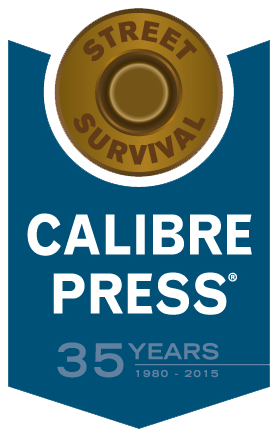



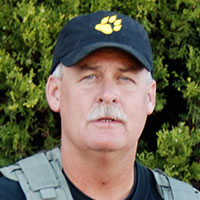
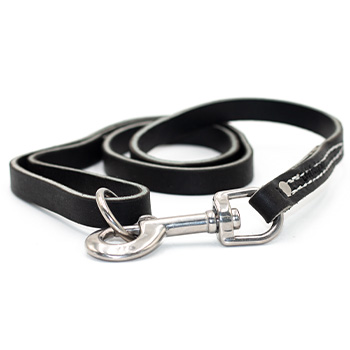
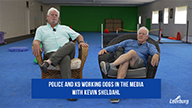
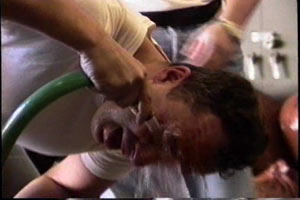
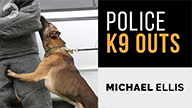
Ask Cindy.